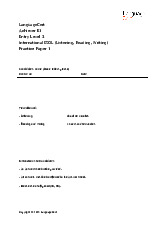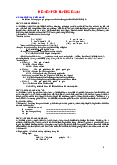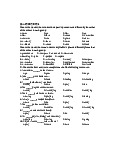




Preview text:
PART 1 INTRODUCTION I. What is semantics?
Task 1. How do you understand the answers in the following conversations?
1. A: “Would you like a piece of cake?” B: “I’m on a diet.”
2. A: “Do you like the wine I pick out?”
B: “It’s Italian, isn’t it?”
Task 2. Read the following sentences and conversations. Notice the instances of the word mean (or means or meant)
1. “Then you should say what you mean”, the March Hare went on
“I do”, Alice hastily replied; “at least I mean what I say – That’s the same thing, you know”.
“Not the same thing a bit”, said the Hatter
2. “I mean to be there tomorrow.” 3. Those clouds mean thunder.
4. ‘Calligraphy’ means ‘beautiful handwriting’.
5. If someone is or has a big mouth, they tend to say things which are meant to be kept secret.
Task 3. Reproduced below is a well-known passage from Lewis Carroll's Through the Looking
Glass. Pick out all the instances of the word mean (or means, or m
eant), noting which lines they
occur in. (Some line numbers are given in the margin for convenience.) After the passage there are
some questions for you to answer. 1
" ... that shows that there are three hundred and sixty-four days when you
might get un-birthday presents." "Certainly," said Alice.
"And only one for birthday presents, you know. There's glory for 5. you!"
"I don't know what you mean by 'glory,' " Alice said.
Humpty Dumpty smiled contemptuously. "Of course you don't - till I tell
you. I meant 'there's a nice knockdown argument for you.' "
"But 'glory' doesn't mean 'a nice knockdown argument," Alice 10 objected.
"When I use a word," Humpty Dumpty said in rather a scornful
tone, "it means just what I choose it to mean -neither more nor less."
"The question is," said Alice, "whether you can make words mean so many different things."
15 "The question is," said Humpty Dumpty, "which is to be master- that's all."
1. What word is the subject of the verb mean in line 6?
2. What is the subject of the verb mean in line 9?
3. What is understood as the subject of the verb mean in line 12?
4. List all the instances (by line number) where mean, means, or meant has a
personal subject, e.g. / or you. (Include instances already listed the questions above.)
5. List all the instances (by line number) in which mean, or means, or meant is understood as
having as subject something linguistic, e.g. a word, or words. (Include instances mentioned in questions above.)
Task 4. Answer the following questions.
(1) Do the following two English sentences mean (approximately) the same thing?
I'll be back later and I will return after some time
(2) Is the answer to the previous question obvious to a normal speaker of English?
(3) In the light of your reply to (2), if I ask "What did John mean when he said he'd be
back later?", would you be giving the helpful kind of answer that I probably want if you
said “He meant that he would return after some time"?
(4) In asking "What did John mean when he said he'd be back later?" is the questioner primarily asking
(a) what the SENTENCE I'll be back later means, or
(b) what JOHN meant in saying it?
(5) A dictionary can be thought of as a list of the meanings of words, of what words mean.
Could one make a list of what speakers (e.g. John, you, or I) mean?
(6) Do you understand this question?
Task 5. Do you agree with the following statements?
1. SEMANTICS is the study of MEANING in LANGUAGE
2. “Meaning” cover a variety of aspects of language.
3. There is no very general agreement either about what meaning is or about the way in which it should be described.
4. The word mean, then, can be applied to people who use language, i.e. to speakers (and
authors), in roughly the sense of 'intend' .
5. The word mean can be applied to words and sentences in a different sense, roughly
expressed as 'be equivalent to'
II. Speaker Meaning vs Sentence Meaning
Task 6. Read the following conversation between two people, A and B, at a bus stop one morning.
(The lines are numbered for reference.) Then answer the questions (1)—(8). 1 A: "Nice day"
2 B: "Yes, a bit warmer than yesterday, isn't it?"
3 A: "That's right — one day fine, the next cooler"
4 B: "I expect it might get cooler again tomorrow"
5A: “Maybe- you never know what to expect, do you?
6 B: "No. Have you been away on holiday?" 7 A: "Yes, we went to Spain"
8 B: "Did you? We're going to France next month"
9 A: "Oh. Are you? That'll be nice for the family. Do they speak French?"
10 B: "Sheila's quite good at it, and we're hoping Martin will improve"
11 A: "I expect he will. I do hope you have a good time"
12 B: "Thank you. By the way, has the 42 bus gone by yet? It seems to be late"
13 A: "No. I've been here since eight o'clock and I haven't seen it"
14 B: "Good. I don't want to be late for work. What time is it now?" 15 A: "Twenty-five past eight"
(1) Does speaker A tell speaker B anything he doesn't
already know in lines 1,3, and 5? Yes /No
(2) Does A's statement in line 7 give B any new information? Yes / No
(3) When B says "Did you?" in line 8, is he really asking A
to tell him whether he (A) went to Spain? Yes /No
(4) Is there any indication that A needs to know the infor -
mation that B gives him about travelling to France? Yes / No
(5) Does A's "That'll be nice for the family" in line 9 give B any information? Yes / No
(6) Do A's statements in lines 13 and 15 give B any infor- mation that he (B) needs? Yes / No
(7) At what point does this conversation switch from an exchange of uninformative
statements to an exchange of informative statements?
(8)At what point does the information exchanged begin to be of a sort that one of the
speakers actually needs for some purpose in going about his everyday business?
Task 7. Consider the following strained exchange between husband and wife. Then answer the questions (1)—(8). Husband:
"When I go away next week, I'm taking the car" Wife:
"Oh. Are you? I need the car here to take the kids to school" Husband:
"I'm sorry, but I must have it. You'll have to send them on the bus"
Wife (ironically):"That'll be nice for the family. Up at the crack of dawn, and not home till mid-
evening! Sometimes you're very inconsiderate" Husband: "Nice day"
(1) This conversation includes three utterances which were also used in the polite bus stop
conversation between A and B. Identify these three utterances
(2) When the wife in the above exchange says "Are you?" is she thereby in some sense
taking up a position opposed to that of her husband?
(3) In the bus stop conversation, when A says "Are you?" (line 9), is he in any sense
taking up a position opposed to B's position?
(4) When the wife, above, says "That'll be nice for the family", is she expressing the
belief that her husband's absence with the car will be nice for the family?
(5) When A says to B at the bus stop "That'll be nice for the family", is he expressing the
belief that going to France will be nice for the family?
(6) Is A's remark at the bus stop "Nice day" a pointed change of subject for the purpose of ending a conversation?
(7) What is the function of this remark of A's?
(8) When the husband uses these same words about the weather, above, what does he mean by it?
Task 8.Look at the following utterances and state whether they are intended to be taken
literally(Yes) or not (No). (1)
Tired traveller: "This suitcase is killing me" Yes /No (2)
Assistant in a shop: "We regularly do the impossible; miracles take a little longer" Yes / No (3)
During a business meeting: "It's a dog-eat-dog situation" Yes / No
Task 9. Answer the following questions.
(1) Can two people hold an ordinary conversation without knowing the meanings of the words they are using? Yes / No (2)
Is it reasonable to say, if I use such English words as table and chair in the normal
way in my conversation, communicating the usual messages that one does with these
and other words, that I know the meanings of the words table and chair? Yes / No (3)
If one knows the meaning of a word, is one therefore necessarily able to produce a
clear and precise definition of its meaning? Yes /No (4)
Conversely, if several speakers can agree on the correct definition of a word, do they know its meaning? Yes /No (5)
Do you happen to know the meaning of the word ndoho in the Sar language of Chad, Central Africa? Yes /No (6)
Would a sensible way to find out the meaning of ndoho be to ask a speaker of Sar
(assuming you could find one)? Yes /No (7)
The word ndoho in Sar means nine, so it is not a particularly rare or technical word.
Would any normal adult speaker of Sar be an appropriate person to approach to ask the meaning of the word? Yes / No (8)
If a native speaker of Sar insists that ndoho means nine (or the number of digits on two
hands, less one, or however he expresses it), while a distinguished European professor of
semantics who does not speak Sar insists that ndoho means ten (or dix, or zehn, however
he translates it), who do you believe, the Sar-speaker or the professor?
Task 10. Do you agree with the following statements?
1. The same sentences are used by different speakers on different occasions to mean
(speaker meaning) different things.
2. Once a person has mastered the stable meanings of words and sentences as defined by the
language system, he can quickly grasp the different conversational and social uses that they can be put to
3. Sentence meaning is determined by the language system.
4. Speaker meaning reflect the will of individual speakers and the circumstances of use on particular occasions.
5. SPEAKER MEANING is what a speaker means (i.e. intends to convey) when he uses a piece of language.
6. SENTENCE MEANING (or WORD MEANING) is what a sentence (or word) means, i.e.
what it counts as the equivalent of in the language concerned.
7. The meanings of words and sentences in a language can safely be taken as known to
competent speakers of the language.
8. Native speakers of languages are the primary source of information about meaning.
III. Basic Facts about Meaning
Task 11. Mark each of the following statements true (T) or false (F).
(1) Alive means the opposite of dead. T / F
(2) Buy has an opposite meaning from sell. T / F
(3) Caesar is and is not a meaningful English sentence. T / F
(4) Caesar is a prime number is nonsensical. T/ F
(5) Caesar is a man is nonsensical. T/ F
(6) Both of John's parents are married to aunts of mine is in a sense contradictory,
describing an impossible situation. T/ F
(1) If the sentence John killed Bill is true of any situation, then so is the sentence Bill is alive. T/ F
(2) If someone says, "Can you pass the salt?", he is normally not asking about his
hearer's ability to pass the salt, but requesting the hearer to pass the salt. T/F
(3) If someone says, "I tried to buy some rice", his hearer would normally infer that he
had actually failed to buy rice. T / F
Task 12. Think carefully about each of the following general statements, and try to say whether it is
true (T) or false (F).
(1) Proper names (like English John or German Hans or French Jean) h ave a different
kind of meaning from common nouns (like English man, or German Mann or French homme). T /F
(2) Prepositions (like English under, or German unter, or French have a different kind of sous)
meaning from both proper names and common nouns. T/ F
(3) Conjunctions (like English and or German und, or French et have ) yet a further kind of
meaning from both proper names and common nouns, and prepositions. T/F
(4) Articles (e.g. English the, German der, or French le) have a different kind of meaning from
proper names, common nouns, prepositions, and conjunctions. T / F




